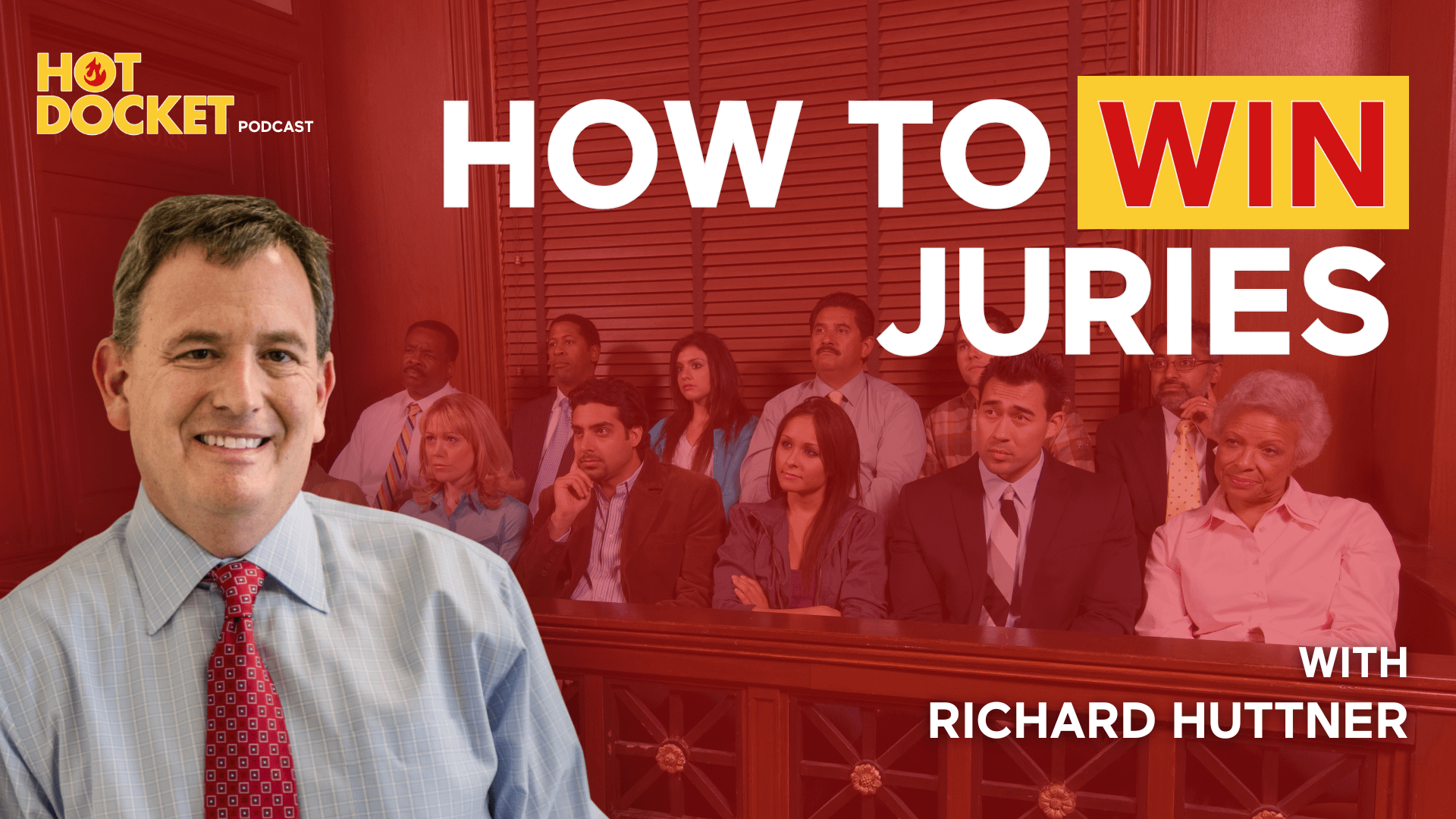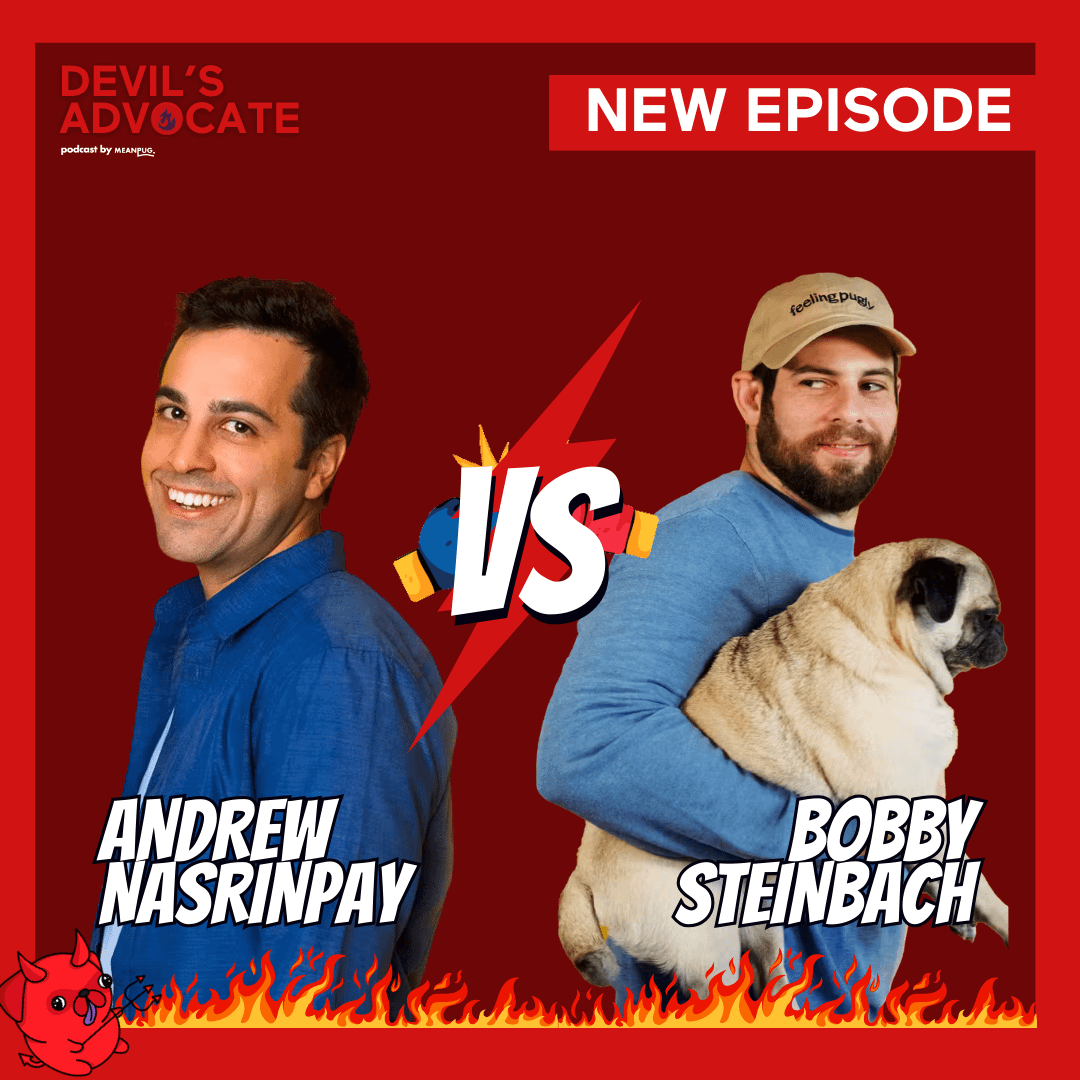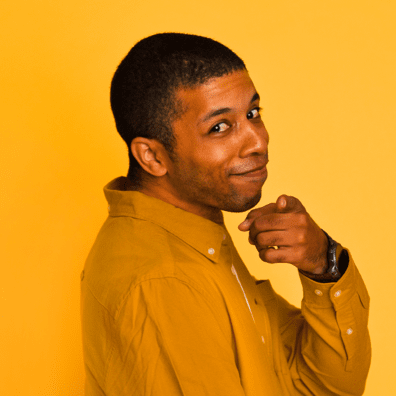
Episode Overview
- From phone book ads to Google Ads: the evolution of law firm marketing.
- Jury selection psychology: how criminal defense lawyers pick the perfect jurors.
- Empathy vs. objectivity: the emotional balance every defense attorney must master.
- Courtroom strategies that win: storytelling, likability, and adaptability on trial day.
- Real-world lessons from 30 years of criminal defense practice.
Episode Links
Want to hear more from elite lawyers and industry-leading marketers?
Follow us on Social Media for more
Episode Topics
Tune in to learn:
- How criminal defense marketing evolved from phone book ads to Google Ads
- Why Richard chose DUI and assault cases over white-collar defense
- Jury selection strategies with surprising psychological insights
- Balancing empathy and objectivity when defending serious criminal charges
- Courtroom strategies that WIN through storytelling and likability
Episode Transcript
Expand Transcript

[00:00:00] Richard Huttner: When you get into a motion practice where you're challenging evidence, when you're challenging what the government is doing, I think every time you're talking about anything other than the facts, when you don't have the facts, that is your best defense. Sometimes you have to add facts and you still gotta make the government prove it, whether it's making them jump over small hoops, big hoops, you know, pounding the table doesn't always help in front of a. [00:00:19] Richard Huttner: It's all about being likable and plausible. You know, the government still has to prove their case at any jury trial. There are cases where I'm going to get my head handed to me and the prosecutor's gonna say, you know, we're gonna beat you. And I'm like, I'll still show up. I will be there. [00:00:30] Bobby Steinbach: Welcome to Hot Docket, the show where we talk about winning marketing strategies that have built the most successful law firms. [00:00:36] Andrew Nasrinpay: Join us every two weeks for the latest trends and tactics to grow your law firm. Welcome to the Hot Docket. Today we're joined by Richard Huttner. Of Richard b Huttner law firm, [00:00:52] Andrew Nasrinpay: and we've got a lot to talk about. So I'm gonna jump right into it. Thanks for having us today, Richard. Thank you. So if you could run through really quick your origin story and why you became a lawyer. Um, it would be really helpful and interesting. [00:01:06] Richard Huttner: I don't know how interesting it is, but I'm a, I come from a family of lawyers. [00:01:10] Richard Huttner: My dad, uh, was a lawyer. Had his own practice, practice, family law and personal injury, and did some criminal defense, uh, which is what I do. And, uh, my brother's a lawyer, my sister's a lawyer. And so if I wanted to have any fun at Thanksgiving, I had to become a lawyer. [00:01:29] Bobby Steinbach: Can't imagine what those conversations must be like. [00:01:32] Richard Huttner: It was painful. It's still painful. Yeah. Um, dealing with lawyers is not always fun. And when they're siblings and you have the sibling rivalry, it. Just, uh, multiplies that pain. So I became a lawyer. Uh, it's something I always wanted to do in law school. I thought I wanted to be a prosecutor because I was a pretty, uh, straight and narrow individual. [00:01:56] Richard Huttner: And sitting through those classes of law school, criminal defense, criminal procedure, criminal law, just kind of made me angry. Uh. Not necessarily with anybody in particular, but with the system as a whole and the fairness to the little guy. And so my first job during law school was a law clerk for a general practitioner who did a little bit of everything. [00:02:22] Richard Huttner: And that wasn't much fun 'cause it was just arguing about money. And then I worked for a personal injury attorney and, uh, learned a lot, uh, learned what I didn't wanna do. And that is. Fight for money. 'cause it just, the passion wasn't there. And so when I graduated, my dad said, well, why don't you try becoming a prosecutor? [00:02:45] Richard Huttner: I said, no, I don't wanna do that. Let's just start from, uh, let's just start doing criminal defense. So I advertised. And back then, in 1993, advertising wasn't on the internet. It was on newspaper ads, phone book, TV guides. And so I, uh, put a small little ad in the TV guide and slowly cases started coming in. [00:03:11] Richard Huttner: And for the first two or three years it was a struggle. And then finally I was able to afford a quarter page ad in the phone book. And then, you know, more cases came in and it just started to ramp up. And finally the phone book guy said, you know, we're getting rid of phone books. And you think that's great because you're not gonna have to pay all that money. [00:03:32] Richard Huttner: Because getting on the internet was cheaper. Uh, now I will tell you that advertising on the internet is far more expensive than it ever was in the phone book [00:03:41] Bobby Steinbach: Blood bath. [00:03:42] Andrew Nasrinpay: Yeah. They, they didn't have you in a Dutch auction to appear at the top, uh, driving the cost per click through the roof back then, did they? [00:03:51] Richard Huttner: No, they did not. It was, it was the personal injury. Guys had the back cover and the center of the phone book and, uh. Personal injury covered probably most of the revenue for the phone book. And finally when you got back to the criminal guys, they could maybe afford a half page, quarter page, eighth of a page. [00:04:11] Richard Huttner: Mm-hmm. And, uh, you know, that's how it all started. And I really got passionate about helping people in their time of need. I've always been a fan of, uh, helping the underdog, so it was easy to root for the underdog, and so it was a natural place for me and. I've had a lot of fun and I've been doing this 30 plus years, and I would say that every day is, uh, enjoyable. [00:04:37] Richard Huttner: I see a lot of stories. I hear a lot of bad things, people that go through tough times, and, uh, at the end of the day, I'm able to help, help, help make their lives a lot easier, and oftentimes, uh, put the, put the, uh, screws to the government to make their, make them prove their case. [00:04:56] Bobby Steinbach: Richard, do you handle both, uh, white collar defense and like non-white collar defense type of stuff? [00:05:02] Bobby Steinbach: I don't, [00:05:03] Richard Huttner: I just, I just do street crimes. [00:05:04] Bobby Steinbach: You just do street crimes. [00:05:05] Richard Huttner: Uh, the number one, the number one crime in America is driving under the influence DUI. So Colorado on average, has about 38,000 DUIs a year throughout the state, and other states have similar large numbers. So that's the number one crime, and that's why most criminal defense lawyers start with DUIs. [00:05:24] Richard Huttner: I enjoy assaults, uh, sex assaults. Um, those are, you know, those are entertaining. And, uh, you know, oftentimes people find themselves in a situation they never expected to find themselves in. And they have to act what they think is [00:05:42] Bobby Steinbach: prudently [00:05:43] Richard Huttner: and they get charged. And when in, in essence, what they did was what anybody else would've done. [00:05:48] Richard Huttner: And that is defend themselves, defend their friends, defend their wives. And, uh, fight back and, and the, and you're allowed to do so. Uh, cases of child abuse, parents are allowed to discipline their kids, and the government comes in and tries to call it child abuse when the, you know, when the school nurse or the teacher sees a spot on little Johnny's arm or on his leg or on his butt, and they come in and say, well, you can't discipline your kid and leave a mark. [00:06:20] Richard Huttner: Well, no, you can. You know, that's as long as it's reasonable. And so I had a little bit of a specialty doing child abuse cases. I went to trial on horrible cases and my clients ended up walking out and it was always, uh, the similar line I used is these are parents that care enough to discipline their kids. [00:06:40] Bobby Steinbach: Mm. How hard is it for you to separate the, like what you hear a lot with criminal defense? At least what I've heard is. You're not necessarily, of course, you're defending your client and advocating for them, but you're also defending their rights and like what they're entitled to as a citizen and yada, yada yada. [00:06:56] Bobby Steinbach: So how, how hard is it for you sometimes to like separate the person from, you know, your duty as an advocate? [00:07:04] Richard Huttner: Well, you know, it's hard when these people are paying you. So when I, I always look over to the public defender. I always tell them that remember that these fact pad fact pattern are our widgets. [00:07:17] Richard Huttner: So when, if you ever took a business class in, in college, you always talked about widgets, you know, just items. And for lawyers, the, these fact patterns are our, are our widgets. And so you try not to get too attached to the person because you lose perspective. And uh, so I just say be, just focus on the fact pattern. [00:07:38] Bobby Steinbach: You know why? That's very interesting. Because we talked to a defense attorney earlier today and one of the things he said is, the thing that separates us in many cases from the public defender is that we take the time to learn and care about our client and like form deep relationships. So I'm not saying that he's right and you're wrong, or you're wrong, you're right and he's wrong. [00:08:00] Bobby Steinbach: But I think it just shows kind of like the different ways that people can be successful. In your role and how you can get through it and, and be the best that you can be as a defender, [00:08:11] Richard Huttner: right? Private attorneys do have the time to get to know our clients, get to know the fact patterns, get to return calls, get to return calls to their relatives, um, get to listen to the whole story where the public defenders don't have that luxury. [00:08:24] Richard Huttner: They have too many cases. They have, you know, 25 to 30 cases showing up on their desk every Tuesday, and they have to get rid of. Most of those cases because the following week or two weeks later, another 25 or 30 cases is showing up on their desk. Private attorneys don't have that type of volume. At least they shouldn't, uh, because they do need to get to know. [00:08:45] Richard Huttner: But if you're gonna argue and do your best possible job for your clients, you have to get the emotional tie away that even though they are paying you, doesn't mean you have to. Ultimately by everything they say, you have to do what's best for them. Looking at the entire picture now, the great Jerry Spence who just died uh, a couple weeks ago, a great lawyer from Wyoming, he always, uh, he always professed that he had to become one with your client. [00:09:17] Richard Huttner: You had to get so interactive with your client that you are him, and that's how you do your best work. And what I found is. That may have worked for him, but it just, you lose perspective sometimes, and sometimes you gotta have that out of body per uh, experience and looking at all the different angles that a jury's gonna look at it. [00:09:40] Richard Huttner: And so understanding a juror's perspective, uh, makes me a very effective attorney and being able to communicate to a jury. [00:09:51] Andrew Nasrinpay: When you're picking jurors, are there any big red flags for you when making that decision? Depends on what the case is. [00:10:00] Richard Huttner: Um, I like jury juries. I like, I love jury trials. I like communicating with jurors. [00:10:06] Richard Huttner: Uh, it really depends on the case on sex assault cases where I have a, a, a male defendant and there's a female, uh, victim alleged victim. I always like older women. 'cause older women are very judgemental on other women. Mm-hmm. Women are tougher on women. They're, they're tough and so they may not, may not like what the woman was wearing. [00:10:32] Richard Huttner: They may not like, uh, that she drank a lot of alcohol. They may, you know, they will, they will prosecute that, that victim, which helps my clients and they will. You know, they may, it may may not be intuitive that a woman's gonna be hard on a woman, but it is, women are hard on women. [00:10:49] Bobby Steinbach: What's your opinion on relatives of cops? [00:10:52] Richard Huttner: You know, relatives of cops? Depends what kind of case it is. A lot of cases, um, you want that because there law and order and they think there's a, a reason and a rhyme. And as long as you're not beating up the cop, uh, you know, I think they're okay. They're not perfect. Uh, but. You know, cases where you beat up the cop are like DUIs. [00:11:14] Richard Huttner: 'cause everything A DUI has that officer as the main witness. They did the stop, they did the observations, they did the field sobriety test. They oftentimes did, were there at the blood test or the breath test. And so the judgment and observations of the officer are paramount in A DUI case. So for the flip side, the flip side of that is officers only look for reasons to. [00:11:40] Richard Huttner: To convict and they never notice the good things in A DUI case. So sometimes you can make them your friend, but oftentimes in DUI cases, they are the, they're your enemy. So you don't want necessarily to beat a, have a, a relative of an officer on your jury. [00:11:56] Andrew Nasrinpay: What, what sort of jury are you looking for? For A DUI case want [00:12:01] Richard Huttner: someone similar to my client. [00:12:03] Richard Huttner: I want, uh, you know, if, if it's a truck driver, I want truck drivers. I don't want parents of little kids. Uh, you know, I want, I want happier people. I don't want divorced people. I don't want, um, I don't want older people. Older people have too much perspective. I want younger, similar to my clients, that I want people that drink, people that understand that. [00:12:30] Richard Huttner: Um, if you went to a football game. And if you were not allowed to drink that, that little football stadium would become a temporary jail for hours and hours until everybody had sobered up. So people that understand that it is okay to have a drink with dinner and to drive home, and that that's not driving under the influence, [00:12:51] Bobby Steinbach: I get the feeling that you have a really deep, intuitive understanding of who you want on these juries based on what happened. [00:13:00] Bobby Steinbach: How much of that did you learn in schooling versus learn on the job and pick up? [00:13:05] Richard Huttner: You know, I'm better and better, uh, picking juries each jury I pick, you know, I, I get a little better and a little better, and that's probably why they call it the practice of law. Um, a lot of lawyers are just so afraid of the process of jury selection. [00:13:20] Richard Huttner: They're just can't wait till that first hour or two hours of a jury trial are done and they've picked their jury. They don't really care. They just want to get through the process. Um, when I first started practicing, I would try to memorize the name of every juror, and I would focus so much on that, that I would not really listen or hear what they were saying. [00:13:40] Richard Huttner: And so I've simplified it. I wanna get the jury, the jurors perspective, jurors to talk. I don't want to talk as much if you watch, uh, jury selection. Uh, most defense lawyers don't know when to shut up. They do all the talking, trying to get them to agree with everything they said. I just wanna get in a conversation and hear about if they're happy in life, what, you know, what, where do they get their news, uh, what would they rather be doing than the job they're doing? [00:14:10] Richard Huttner: Just those small things you can kind of pick up on a juror, whether, and they'll get into conversations and topics that you wouldn't expect, and you just learn about them and then you can kind of get an idea of. When I want to have sit down with this person for two or three hours and talk about facts, because ultimately that's what they're going to be doing with their five or 11 other people. [00:14:33] Bobby Steinbach: You know, one thing I've been thinking about is to, to take a roundabout way to get there. I, I've been doing a lot of reading recently on like the practice of selling and the science of selling because it's not something that's intuitive to me. Uh, my background's computer science, done a lot of marketing. [00:14:51] Bobby Steinbach: But I've never took business classes. I've never been in a sales job. I've never done any of it. So I've been trying to learn about that process. And one thing that comes up often is this concept of getting little yeses towards the end goal of getting the big yes. Right. So like many small agreements along the way does that. [00:15:12] Bobby Steinbach: Apply to your work in like, uh, a jury trial as well, like getting many small yeses and convincing the jury of many small yeses to get to that big Yes. [00:15:23] Richard Huttner: You know, they, they say that in the marketing classes that, you know, if you get, when you create your cross examinations to get the, the witness to say yes, yes, yes, yes, yes. [00:15:33] Richard Huttner: That the, uh, jurors are gonna go along with Yes. Um, so I, I do try to. To go along with that. I don't know if it works or doesn't work. I, I try my cases on, uh, being practical and if the evidence doesn't corroborate with the story, then the jury's not gonna necessarily buy it. And so, you know, they're gonna, there's gonna be two stories. [00:15:58] Richard Huttner: It's about likability. If you can make your witness be likable or if you can make the victim in a domestic violence case, be unlikable. You have a shot. And really it's, while it may be proof beyond a reasonable doubt, oftentimes it's whose story or who do they like better? And that's just a practical element of jury trials and human behavior. [00:16:22] Bobby Steinbach: I feel like I'm maybe overusing this particular point a lot now, but I'm gonna do it anyway. We spoke to a lawyer a while ago and something he said, which has stuck with me is. If you have the facts, pound the facts. If you have the law, pound the law. If you have neither pound the table, which do you find yourself doing like most often in your cases? [00:16:45] Bobby Steinbach: Um, you know, uh, [00:16:48] Richard Huttner: in a lot of cases, I think when you get into emotions practice where you're challenging evidence, when you're challenging what the government is doing, I think every time you are talking about anything other than the facts, when you don't have the facts. Is your best defense. So when you get the government trying to, to, you know, vouch for a, a witness or try to, you try to keep a witness out or trying to keep an expert out, and you're not talking about the facts of the case, that just is burning their energy. [00:17:20] Richard Huttner: And so it's making 'em focus on other things than they're facts. So sometimes you have bad facts and you still gotta make the government prove it. And so. Whatever way to do that, whether it's, uh, making them jump over small hoops, big hoops, uh, you know, pounding the table doesn't always help in front of a jury. [00:17:41] Richard Huttner: It's all about being likable and plausible, you know, and, you know, the government still has to prove their case at any jury trial. The government, it's tough to put on a trial. So there are cases where I'm going to get my, my head handed to me. Prosecutor's gonna say, you know, we're gonna beat you. And I'm like, I'll still show up. [00:18:02] Richard Huttner: I will be there. Okay. I don't mind banging my head against the mens. They still have to put on their case. They still have to bring their witnesses, they still have to bring their experts, they still have to get testimony to the finish line. And oftentimes things happen. It is the litigation gods. They sometimes, you know, an officer has a tragedy, can't make it to trial. [00:18:26] Richard Huttner: Uh, a, a technician isn't able to testify on that date 'cause her, her kid's sick and so they have to, they have some type of hiccup in their case and amazingly you get a better offer on the day of trial or even during trial because there's a problem with their case. And so, yeah, you know, sometimes you gotta sit through it and sometimes they can put on their case and you end up. [00:18:51] Richard Huttner: Dead in the water and sometimes, uh, good things happen. That's why it's always, it's never over till it's over. [00:18:58] Bobby Steinbach: All right. Well I think that's a good segue for us to call it on this one and make it over. Um, I'm also gonna pull away litigation gods. As a takeaway from this episode. Love that. Um, thanks for joining us, Richard. [00:19:12] Bobby Steinbach: I think this was an informative episode. Learned a ton. Um, yeah, we'll put links to, to your site, to your firm, and then get all that stuff in the episode links so folks have it. Thanks for joining us on Hot Docket. Very good. And, uh, we'll see you on the next one. We hope you've enjoyed this episode of Hot Docket. [00:19:29] Bobby Steinbach: We're your hosts, Bobby and Andrew, founders of Meme Pug, the marketing agency for ambitious law firms. [00:19:35] Andrew Nasrinpay: Have questions about marketing or anything we covered today? Email us at bark@meanpug.com. Be sure to subscribe to learn more. Until next time.










